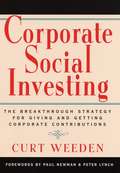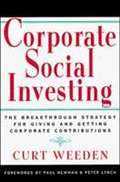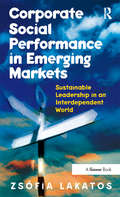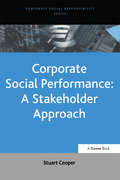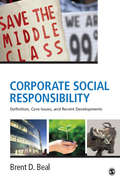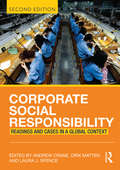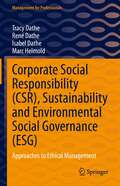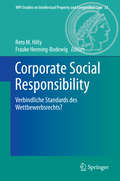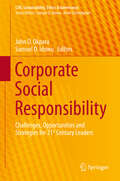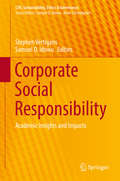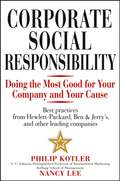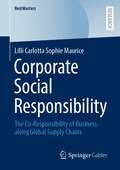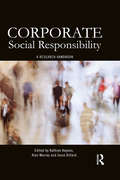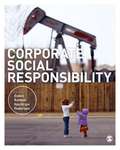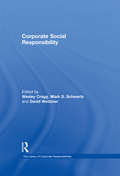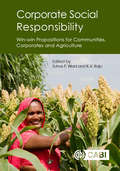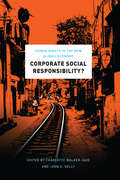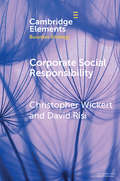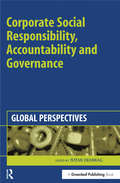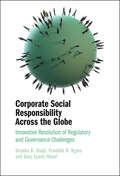- Table View
- List View
Corporate Social Investing
by Curt WeedenCorporate philanthropy is on its way out. A new concept called "corporate social investing"-which requires that every commitment of money and/or product/equipment/land which a company makes must have a significant business reason-is taking its place. The transition has implications to every business and nonprofit organization in America. This book provides the strategic plan for making the transition to corporate social investing. By following the practical steps described here, businesses and nonprofits can forge creative alliances that can boost corporate profits while at the same time providing added resources for schools, colleges, cultural organizations, civic groups, and other important charities. Weeden's breakthrough plan, based on his innovative concept of corporate social investing, has the potential to dramatically change the way businesses and nonprofits interact. If widely implemented, it could substantially increase corporate support for nonprofits, turning the tide against cutbacks, offering profound benefits to businesses, and revitalizing the essential services nonprofits provide.
Corporate Social Investing: Breakthrough Strategy for Giving and Getting Corporate Contributions
by Curt WeedenThis is an advanced strategy for giving and getting corporate contributions with various depictions through calculations on the basis of situations from actual economical and statistical world.
Corporate Social Irresponsibility
by Paula AlexanderCorporate Social Irresponsibility focuses on ethical failures in order to relate corporate responsibility to business ethics, corporate governance, and organization effectiveness. The book advocates a strategic approach to CSR – ethical management cannot, and should not, be divorced from effective management. Corporate social responsibility has transitioned from oxymoron into a defining challenge of the twenty first century. Taking the recent financial crisis as a starting point, Alexander examines the underlying ethical and legal crises these events expose in the business world. The problems that have come to light go beyond issues of firm financial performance into the integrity of the manufacturing and marketing processes, and relations with consumers. As such, the book presents a model that resolves the apparent conflict between maximizing shareholder value, and meeting the interests of other firm stakeholders. Alexander presents a balanced view, contrasting her model with alternative approaches. The book also covers the impact of globalization on management, the ethics of outsourcing, the limits of regulation, as well as poverty alleviation and social entrepreneurship. Blending a comprehensive theoretical framework with a broad range of cases, this book covers the latest major changes in US legislation, as well as recent corporate scandals making it a valuable accompaniment to any course in CSR, business ethics, or business, government and society.
Corporate Social Opportunity!: Seven Steps to Make Corporate Social Responsibility Work for your Business
by David Grayson Adrian HodgesThis practical guide is designed to help business leaders and their managers understand how to assess the impact of corporate social responsibility factors on their core business strategy and operations, and help them identify and prioritize between subsequent options and resulting business opportunities
Corporate Social Performance in Emerging Markets: Sustainable Leadership in an Interdependent World
by Zsófia LakatosWhen it comes to perceptions of what is a sustainable economy and how it may be realised, companies expanding into Central and Eastern European markets face the challenge of diverse people, attitudes and history. Corporate Social Performance in Emerging Markets provides an effective tool for companies to help them engage in CSR activities and become a responsible company in CEE countries such as Poland, Hungary, the Czech Republic, Slovakia, Croatia and Slovenia. It does this by enabling them to focus on the difference of stakeholders and their attitudes to those of Western Europe. The author, Zsófia Lakatos, provides a review of the major differences between the various CEE countries, supported by interview research from leading executives in some of the blue-chip companies already operating in the region.
Corporate Social Performance: A Stakeholder Approach (Corporate Social Responsibility Series)
by Stuart CooperCorporate social performance has come of age. In a business environment characterized by its perpetual state of flux, the ability to recognize and react to global forces becomes paramount. The fallout of such rapid change - the fast-paced developments in communications and technology, the continual change to global markets, shifting demographics, the homogenization of personal values - have all contributed to the widespread new interest in issues such as ecology and environment, human rights and diversity, health and well-being, and communities. All of these issues are now potential liabilities for companies, and are very much back on the agenda for business. Once regarded as peripheral management concerns, they are now recognized as hard to predict and hard for business to deal with when they go wrong. This book offers an insight into how corporate social performance can be measured and why this is an important aspect of corporate social responsibility. Using detailed case studies, it provides readers with the foundations for understanding and applying corporate social performance, providing a stakeholder framework by which corporate social performance can be measured, alongside a detailed consideration of the value of different stakeholder measures. The book also applies this framework to new social accounting standards, enabling the reader to consider the validity and appropriateness of these standards. The increasingly important role of the internet for corporate social reporting is also considered.
Corporate Social Responsibility: Definition, Core Issues, and Recent Developments
by Brent D. BealThis unique supplemental text offers a well-structured and thorough introduction to corporate social responsibility (CSR). Author Brent D. Beal introduces the basic concept of CSR, briefly discusses the challenges of defining it, and summarizes important conceptual models. CSR is examined in the context of the perfect competition market model, market failure, and social dilemmas. Three different types of CSR—systemic, strategic, and philanthropic—are highlighted. Finally, arguments both for and against CSR are outlined and several conceptual frames are proposed. Readers are encouraged to think about what businesses should be responsible for in society and how a society’s economic system should be structured, bounded, and ultimately, controlled. This text is appropriate for any business course in which the introduction of CSR would complement other course content.
Corporate Social Responsibility: Readings and Cases in a Global Context
by Andrew Crane Dirk Matten Laura SpenceAs a relatively young subject matter, corporate social responsibility has unsurprisingly developed and evolved in numerous ways since the first edition of this textbook was published. Retaining the features which made the first edition a top selling text in the field, the new edition continues to be the only textbook available which provides a ready-made, enhanced course pack for CSR classes. Authoritative editor introductions provide accessible entry points to the subjects covered - an approach which is particularly suited to advanced undergraduate and postgraduate teaching that emphasises a research-led approach. New case studies are integrated throughout the text to enable students to think and analyze the subject from every angle. The entire textbook reflects the global nature of CSR as a discipline and further pedagogical features include chapter learning outcomes; study questions; ‘challenges for practice’ boxes and additional ‘further reading’ features at the end of each chapter. This highly rated textbook now also benefits from a regularly updated companion website which features a brand new 'CSR Case Club' presenting students and lecturers with further case suggestions with which to enhance learning; lecture slides; updates from the popular Crane and Matten blog, links to further reading and career sites, YouTube clips and suggested answers to study questions. An Ivey CaseMate has also been created for this book at https://www.iveycases.com/CaseMateBookDetail.aspx?id=335.
Corporate Social Responsibility: Approaches to Ethical Management (Management for Professionals)
by Marc Helmold Tracy Dathe René Dathe Isabel DatheThis book provides a comprehensive overview of corporate social responsibility (CSR) and its practical applications. In addition to the structured procedure with definitions and CSR approaches, functions within the value chain are described in comprehensive manner with reference to business practice. Business trends in special sectors such as innovation management and hospitality management are also covered. Numerous practical examples and country-specific recommendations for decisions in practical situations are also offered.
Corporate Social Responsibility: Verbindliche Standards des Wettbewerbsrechts? (MPI Studies on Intellectual Property and Competition Law #21)
by Reto M. Hilty Frauke Henning-BodewigIm Zuge der Finanz- und Wirtschaftskrise wird verstärkt diskutiert, welcher Mechanismen es bedarf, um die Interessen aller Marktteilnehmer im Wirtschaftsleben zu wahren. Große Bedeutung gewonnen hat dabei der Aspekt der ,,business ethics". So richten immer mehr Unternehmen sog. Compliance-Abteilungen ein, die die Einhaltung von unternehmensinternen Grundsätzen wie namentlich die der ,,Corporate Social Responsibility" (CSR) zur Aufgabe haben. Kaum untersucht ist bislang jedoch die rechtliche Verbindlichkeit solcher CSR-Standards, obgleich sie zunehmend von Unternehmen auf ihrer Website verkündet oder auf anderem Wege zu Public Relations- und Marketingzwecken - bis hin zur Werbung - eingesetzt werden. Sind CRS damit nur wohlklingende Absichtserklärungen, oder handelt es sich um rechtlich verbindliche Standards - und wenn ja, unter welchen Voraussetzungen entsteht ein Rechtsanspruch gegen Unternehmungen, wenn diese die sich selbst gegebenen Standards nicht einhalten? Anders gefragt: Gibt es ein ,,corporate right to lie", oder setzt das (deutsche, europäische, internationale) Recht Grenzen? Im Fokus steht hierbei das Recht zur Bekämpfung unlauteren Wettbewerbs, im deutschen Sprachgebrauch kurz auch Lauterkeitsrecht genannt, das in allen entwickelten Wirtschaftsnationen - wenn auch mit unterschiedlichem Ansatz - Markthandlungen unter dem Gesichtspunkt der ,,Fairness" überprüft. Die Autoren der Beiträge dieses Buches sind ausgewiesene Fachleute des Europa-, Wirtschafts- und Wettbewerbsrechts. Sie diskutieren auf der Grundlage rechtstatsächlicher Erkenntnisse alle mit der wettbewerbsrechtlichen Beurteilung von CSR zusammenhängenden Fragen, insbesondere unter Berücksichtigung der Rolle, die CSR für Unternehmen, Abnehmer und die Gesamtwirtschaft spielt. Auch die Vorstellungen anderer Rechtsordnungen und Kulturkreise sind einbezogen. Gefragt wird letztlich, ob es ein Unternehmerleitbild gibt, das die Beachtung ethischer Standards einschließt und das über das Lauterkeitsrecht auch rechtliche Verbindlichkeit erlangt. Mit Keynote von Gesine Schwan.
Corporate Social Responsibility: Challenges, Opportunities and Strategies for 21st Century Leaders (CSR, Sustainability, Ethics & Governance)
by Samuel O. Idowu John O. OkparaIn today's global business environment it is no longer acceptable that a corporation does well simply by doing good. It is expected. With increasing pressures from stakeholders to improve the bottom line as well as to be good corporate citizens, business leaders face tough decisions. What social issues should we support? What initiatives should we develop that will do the most good for the company as well as the cause? Do we include social messages in our advertising, encourage our employees to volunteer, do we modify our business practices? How do we integrate a new initiative into current strategies? These and other challenges will continue to face future leaders. This book provides thoughtful answers to these important questions, and to many more. The book offers suggestions on how to choose among major worthy causes and also how to measure the amount of good achieved both for the recipients and the companies themselves. Of course, all is not only about challenges, there are loads of opportunities that go along with them but it's only responsible and sustainable leaders who would be able to spot these opportunities. That is the future which awaits 21st century leaders.
Corporate Social Responsibility: Academic Insights and Impacts (CSR, Sustainability, Ethics & Governance)
by Samuel O. Idowu Stephen VertigansThis work collects the most important results presented at the Congress on Differential Equations and Applications/Congress on Applied Mathematics (CEDYA/CMA) in Cádiz (Spain) in 2015. It supports further research in differential equations, numerical analysis, mechanics, control and optimization. In particular, it helps readers gain an overview of specific problems of interest in the current mathematical research related to different branches of applied mathematics. This includes the analysis of nonlinear partial differential equations, exact solutions techniques for ordinary differential equations, numerical analysis and numerical simulation of some models arising in experimental sciences and engineering, control and optimization, and also trending topics on numerical linear Algebra, dynamical systems, and applied mathematics for Industry. This volume is mainly addressed to any researcher interested in the applications of mathematics, especially in any subject mentioned above. It may be also useful to PhD students in applied mathematics, engineering or experimental sciences.
Corporate Social Responsibility
by Philip Kotler Nancy LeeToday, corporations are expected to give something back to their communities in the form of charitable projects. In Corporate Social Responsibility, Philip Kotler, one of the world's foremost voices on business and marketing, and coauthor Nancy Lee explain why charity is both good P. R. and good for business. They show business leaders how to choose social causes, design charity initiatives, gain employee support, and evaluate their efforts. They also provide all the best practices and cutting-edge ideas that leaders need to maximize their contributions to social causes and do the most good. With personal stories from twenty-five business leaders from socially responsible companies, this is the bible for today's good corporate citizen.
Corporate Social Responsibility: The Co-Responsibility of Business along Global Supply Chains (BestMasters)
by Lilli Carlotta MauriceThis book attempts to clarify the social responsibility of business along global supply chains beyond mere profit maximisation as famously argued by Milton Friedman. In this context, corporate social responsibility (CSR) is understood as the responsibility of business to align corporate policies and procedures with commonly accepted ethical standards and to respect stakeholders’ rights in day-to-day business. As such, CSR is by no means voluntary but constitutes a fundamental prerequisite for companies to keep their license to operate for sustainaable growth and survival in an ever more competitive global market. Inspired by Germany' recent efforts to regulate global supply chains, Germany's Due Diligence Act is analysed in terms of its potential and limitations to promote responsible business practices and complemented by alternative approaches for more co-responsibility of business globally.
Corporate Social Responsibility: A Research Handbook
by Alan Murray Kathryn Haynes Jesse DillardConcepts of corporate social responsibility (CSR) are widely used by businesses, professional bodies and academics, but are also widely contested. CSR is usually described as comprising three elements: environmental, economic and social, though there is no serious consensus on how to go about translating ideas into practice. This research handbook addresses some key areas of contention, theory and practice within CSR in order to address, challenge and inform debate in academia and practice. The collaborative text extends understanding of CSR through articulating current thinking on each facet of a vital subject. Each theme is represented by inter-disciplinary discussion of key questions on CSR by researchers and practitioners in the field. In doing so, the book: Explores and critiques CSR goals, and national, organizational and managerial strategies Reviews the distinctive role and importance of CSR to academics, professionals and practitioners and identifies appropriate bridging strategies Evaluates the nature, direction and applicability of selected theoretical dimensions which inform the understanding of CSR Assesses the opportunities for theory building, to support further understanding of the complexities of CSR and the sustainability and long term value of CSR practice to corporations and civil society This timely and significant contribution to the theory and practice of CSR will prove to be vital reading for students, researchers and practitioners involved with the field. It will also become a key reference for anyone with an interest in business and society.
Corporate Social Responsibility
by Esben Rahbek Pedersen*Shortlisted in the Management and Leadership Textbook Category at CMI Management Book of the Year Awards 2016* Instructors - Electronic inspection copies are available or contact your local sales representative for an inspection copy of the print version. Why has CSR become part of the mainstream business and academic agenda in the 21st century? How can CSR be fully integrated in business strategy and day-to-day operations? Do companies become more vulnerable to criticism from stakeholders if they make public their commitment to CSR? These are just some of the questions and challenges explored in this exciting new textbook. Readers will not only gain comprehensive knowledge and understanding of the history of CSR, the key CSR drivers, the main theoretical CSR perspectives and the dominant CSR practices found in the business community, they will also, more crucially, learn how to implement CSR in practice. Written and edited by leading academics in the field, Corporate Social Responsibility is an engaging and accessible text designed for any student seeking an introduction to this complex and ambiguous subject. Esben Pedersen is Professor at the CBS Center for Corporate Social Responsibility, Copenhagen Business School. Visit the Companion Website at (https://study.sagepub.com/pedersen) for annotated web links, free full-text journal articles and more.
Corporate Social Responsibility
by Esben Rahbek PedersenWhy has CSR become part of the mainstream business and academic agenda in the 21st century? How can CSR be fully integrated in business strategy and day-to-day operations? Do companies become more vulnerable to criticism from stakeholders if they make public their commitment to CSR? These are just some of the questions and challenges explored in this exciting new textbook. Readers will not only gain comprehensive knowledge and understanding of the history of CSR, the key CSR drivers, the main theoretical CSR perspectives and the dominant CSR practices found in the business community, they will also, more crucially, learn how to implement CSR in practice. Written and edited by leading academics in the field, Corporate Social Responsibility is an engaging and accessible text designed for any student seeking an introduction to this complex and ambiguous subject. Esben Pedersen is Professor at the CBS Center for Corporate Social Responsibility, Copenhagen Business School. Visit https://study.sagepub.com/pedersen for annotated web links, free full-text journal articles and more.
Corporate Social Responsibility
by Andreas Rasche Mette Morsing Jeremy MoonAlthough the idea of social responsibility has a long and distinguished intellectual pedigree, Corporate Social Responsibility (or 'CSR') has re-emerged during the last fifteen years or so as a high-profile concept in both academia and business practice. This revitalized interest has come about largely because of the development of the 'markets for virtue' that have institutionalized CSR in business practices in an unprecedented manner. CSR has achieved organizational distinctiveness within companies (e. g. in managerial and board responsibilities); social and environmental reporting requirements have dramatically increased; socially responsible investment funds have not only established themselves in their own right, but have also informed more mainstream investment criteria, particularly regarding social and environmental risk; a CSR consultancy industry has emerged, along with various 'vanguard groups' and NGOs who seek not only to promote CSR, but also to bring critical perspectives to bear and to raise CSR standards; and governments around the globe have encouraged investment in CSR, better reporting of these activities, and the implementation of CSR initiatives that complement broader public policies. As research in and around CSR blossoms as never before, this new four-volume collection from Routledge's acclaimed Critical Perspectives on Business and Management series meets the need for an authoritative reference work to make sense of a rapidly growing and ever more complex corpus of literature. Edited by two scholars from Nottingham University's world-class International Centre for Corporate Social Responsibility, the collection gathers foundational and canonical work, together with innovative and cutting-edge applications and interventions. With a full index, together with a comprehensive introduction, newly written by the editors, which places the collected material in its historical and intellectual context, Corporate Social Responsibility is an essential work of reference. The collection will be particularly useful as an essential database allowing scattered and often fugitive material to be easily located. It will also be welcomed as a crucial tool permitting rapid access to less familiar--and sometimes overlooked--texts. For researchers, students, practitioners, and policy-makers, it is as a vital one-stop research and pedagogic resource.
Corporate Social Responsibility: An Ethical Approach (The Library of Corporate Responsibilities)
by Mark S. SchwartzThe essays in this volume examine the emergence of the concept of corporate social responsibility, and the uses that have been made of the language of corporate responsibility to explore the business/society relationship. The first section traces the emergence of the concept of corporate social responsibility as a way of understanding and framing the business/society relationship. Section two of the volume looks at "Definitions and ethical justifications" with a view to exploring current discussions of the nature, scope and source of the social responsibilities of corporations. Section three, "CSR and Management: Critical Reflections", explores the integration of CSR theories and justifications into business management and business management theories. Articles in the final section of the volume apply the concept of corporate social responsibility, and the theoretical frameworks and analytical tools to which it has given rise, to the examination and resolution of specific social issues arising out of the economic activities of corporations.
Corporate Social Responsibility: Win-win Propositions for Communities, Corporates and Agriculture
by Anand K. Singh Aviraj Datta O. P. Chaturvedi S. K. Dasgupta Gajanan Sawargaonkar Girish Chander A.V.R. Kesava Rao Kaushal Garg Mukund Patil G. Pardhasaradhi K Srinivas Raghavendra Sudi Inder Dev Kiran J. Petare Nagaraju Budama Rajesh Nune Ramesh Singh A. N. Rao Prabhakar Pathak D.S. Prasad Rao C. Srinivasa RaoThis book examines the design and implementation of corporate social responsibility (CSR) activities in rural areas, based on collaboration between well-known corporates and an international research organization. Researchers used various scientific tools and methods to enhance rural livelihoods and improve sustainable natural resources management. Including three chapters covering the philosophy and practices of CSR, this book covers emerging policies and their implications in India. Eight case studies based on actual practices explore climate-resilient agriculture, water footprint, improving livelihoods, diversification of crop pattern, enhancing crop productivity, and sustainable development in low rainfall regions. Five further chapters cover soil health improvement, improving rural wastewater management and enhancing rural livelihoods, based on various case studies. The book offers macro and micro perspectives of CSR work and its critical benefits to both community and natural resources. This book covers: Philosophy and practices of corporate social responsibility. Impact studies on improving livelihoods and sustainable development of natural resources. Process steps across various CSR initiatives. Distinct features of each corporate agency. This book will be useful to corporates, individuals involved in CSR work as well as students and researchers focused on agricultural development and the sustainable development of natural resources.
Corporate Social Responsibility?: Human Rights in the New Global Economy
by Charlotte Walker-Said John D. KellyWith this book, Charlotte Walker-Said and John D. Kelly have assembled an essential toolkit to better understand how the notoriously ambiguous concept of corporate social responsibility (CSR) functions in practice within different disciplines and settings. Bringing together cutting-edge scholarship from leading figures in human rights programs around the United States, they vigorously engage some of the major political questions of our age: what is CSR, and how might it render positive political change in the real world? The book examines the diverse approaches to CSR, with a particular focus on how those approaches are siloed within discrete disciplines such as business, law, the social sciences, and human rights. Bridging these disciplines and addressing and critiquing all the conceptual domains of CSR, the book also explores how CSR silos develop as a function of the competition between different interests. Ultimately, the contributors show that CSR actions across all arenas of power are interdependent, continually in dialogue, and mutually constituted. Organizing a diverse range of viewpoints, this book offers a much-needed synthesis of a crucial element of today's globalized world and asks how businesses can, through their actions, make it better for everyone.
Corporate Social Responsibility: Win-win Propositions for Communities, Corporates and Agriculture
by S P Wani Dr K V Raju Anand K. Singh Aviraj Datta O. P. Chaturvedi S. K. Dasgupta Gajanan Sawargaonkar Girish Chander A.V.R. Kesava Rao Kaushal Garg Mukund Patil G. Pardhasaradhi K Srinivas Raghavendra Sudi Inder Dev Kiran J. Petare Nagaraju Budama Rajesh Nune Ramesh Singh A. N. Rao Prabhakar Pathak D.S. Prasad Rao C. Srinivasa RaoThis book examines the design and implementation of corporate social responsibility (CSR) activities in rural areas, based on collaboration between well-known corporates and an international research organization. Researchers used various scientific tools and methods to enhance rural livelihoods and improve sustainable natural resources management. Including three chapters covering the philosophy and practices of CSR, this book covers emerging policies and their implications in India. Eight case studies based on actual practices explore climate-resilient agriculture, water footprint, improving livelihoods, diversification of crop pattern, enhancing crop productivity, and sustainable development in low rainfall regions. Five further chapters cover soil health improvement, improving rural wastewater management and enhancing rural livelihoods, based on various case studies. The book offers macro and micro perspectives of CSR work and its critical benefits to both community and natural resources. This book covers: Philosophy and practices of corporate social responsibility. Impact studies on improving livelihoods and sustainable development of natural resources. Process steps across various CSR initiatives. Distinct features of each corporate agency. This book will be useful to corporates, individuals involved in CSR work as well as students and researchers focused on agricultural development and the sustainable development of natural resources.
Corporate Social Responsibility (Elements in Business Strategy)
by Christopher Wickert David RisiThis Element offers a thought-provoking and critical examination of corporate social responsibility (CSR). CSR has entered the boardroom and become a mainstream management concept for businesses to address their ethical, social and environmental responsibilities towards society. CSR does not come without contestation, and firms engage in CSR for different reasons and exhibit different patterns of CSR activities. These activities range from sincere action with substantial social or environmental improvements to symbolic impression management and the creation of a CSR-façade that is little more than empty words. This Element illuminates and scrutinizes contemporary approaches to CSR and offers a fresh perspective for scholars, managers and decision-makers interested in the societal role of business firms beyond maximizing profitability. Christopher Wickert and David Risi take a step back from how CSR is currently understood and practiced, and stimulate readers to reflect on how to move CSR forward towards a more inclusive concept.
Corporate Social Responsibility, Accountability and Governance: Global Perspectives
by Istemi DemiragThe "business case" for corporate social responsibility, which suggests that socially and environmentally aware companies can expect to reap financial rewards, is seemingly gaining widespread acceptance within the business community. This is particularly apparent in the ever-increasing number of prominent companies parading their social, ethical and environmental credentials by producing paper- or web-based social and environmental, or sustainability, reports. In so doing, reporting companies claim, they are demonstrating a clear commitment to transparency and accountability to their key stakeholder groups. However, in the prevailing voluntaristic, business-case-centred climate within which such initiatives are taking place, little thought appears to have gone into the question of how stakeholders, other than the capital provider group, can actually use corporate disclosures offered in order to hold management accountable for the social and environmental consequences of their actions. While much corporate rhetoric abounds concerning notions of stakeholder dialogue and engagement, rigorous analysis of the governance implications of their claimed commitment to the principles of corporate social responsibility is largely conspicuous by its absence. Corporate Social Responsibility, Accountability and Governance seeks to explore this "missing link" between CSR (and associated reporting initiatives) and governance mechanisms that are capable of embracing true stakeholder accountability. A wide range of case studies, drawing on experiences of both public- and private-sector initiatives in Europe, the United States, Canada, South America and Asia, offer insightful analysis of the complex relationships between the state, the market and civil society in the development of CSR, accountability and sustainable development. The book employs a multidisciplinary perspective in order to analyse the political, social, economic, technological, legal and organisational shaping of CSR. The complexities underpinning the concept are thereby clearly drawn out and the gross oversimplifications inherent in the prevailing consultancy-driven, business-case literature painfully exposed. Above all, the book offers a sound, practically and theoretically informed contribution to public policy debate and reflects and builds on urgent calls from public- and private-sector policy-makers as well as academics to develop better governance and accountability frameworks for business to deal with the imperatives of social responsibility, sustainable development and ethics. This book is divided into five parts. In Part 1, the complex concepts of responsibility, accountability and governance are discussed, and in particular the presumed relationships between the state, the market and civil society in improving accountability and governance are explored and critiqued. Part 2 consists of chapters relating to corporate social responsibility and stakeholder theory. Part 3 is concerned with empirical studies covering governance structures, networking and corporate social responsibility. Part 4 deals with corporate governance and its implications for regulators and civil society. Part 5 discusses multinational companies and how they impact on national governance regimes. Finally, a summary is provided with emerging international patterns of accountability and governance structures. Corporate Social Responsibility, Accountability and Governance will be essential reading for public and private policy-makers and practitioners and academics interested in how CSR can become more than a soundbite, and rather a substantial force for better global corporate governance and accountability.
Corporate Social Responsibility Across the Globe: Innovative Resolution of Regulatory and Governance Challenges
by Onyeka K. Osuji Franklin N. Ngwu Gary Lynch-WoodCorporate Social Responsibility Across the Globe demonstrates many ways that CSR can be applied by law to overcome regulation and governance challenges around the world. Using interdisciplinary and comparative models and perspectives, the book challenges dominant understandings of CSR, such as neoliberal voluntarism, and demonstrates the regulatory and governance implications of an interdependent relationship between CSR and the law. The book identifies substantive and procedural barriers for CSR in national, public, and private international law. By analyzing, deconstructing, and reframing CSR in these contexts, the book underlines opportunities for more effective application of CSR as a governance mechanism. Chapters investigate relevant regulation concepts, paradigms and approaches for CSR; methods for infusing CSR in corporate governance; and ways to facilitate private regulation of CSR in more developed, emerging, and developing jurisdictions.
